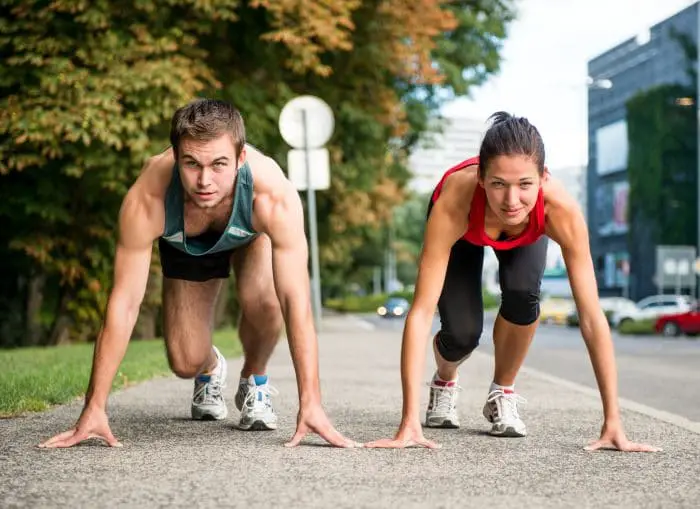Table of Contents
Many people have heard of sports psychology but they don’t know how sport psychology enhances performance. Sport psychologists can work as part of a team’s regular coaching staff or for individual athletes. They help the athletes improve their performance through mental game skills. Below we have answered the question “How does sport psychology enhance performance?” in greater depth.
*This post may contain affiliate links. As an Amazon Associate we earn from qualifying purchases.
1. Easing Performance Fears

Some simple pre-game tips are to visualize, prepare, and accept that pre-game jitters are normal. A few studies have found that visualization can increase sport performance. Don’t try fighting pre-game jitters or misinterpret the nervousness as fear. The adrenaline rush is part of your body’s preparation for competition. Before the event, one should visualize playing well.
2. Developing Mental Skills
Sport psychologists know mental game skills that can enhance performance. Focus, confidence, composure, trust, and intensity are examples of mental skills that help improve performance. A sports psychologist can help an athlete develop any of these areas.
One way to improve your confidence is to ask yourself when you are most confident and when you are least confident in the sport. Draw a line down the middle of a sheet of paper and write when you are most confident on the left and least confident on the right. List at least three situations on each side. Once you have greater clarity on what causes your confidence levels to drop, you will be better prepared to combat those moments with sport psychology tips you’ve learned for building confidence.
3. Helps with Physical Recovery
You might not play as well as you originally did after returning to the sport after an injury. Sports injuries, however, are often more than a physical problem. They negatively impact an athlete mentally and emotionally as well. Athletes are devastated when the doctor tells them they need to rest for several months to allow their body time to heal. They’re eager to get back in the game. Feelings of frustration can be hard for them to handle, which is where a sport psychologist is helpful. The sport psychologist can help the athlete stick to recovery and return to the game a better player than before.
How does sport psychology enhance performance after an athlete has returned to the sport following an injury? It can prevent mental scars from negatively impacting an athlete’s performance. Some athletes find they aren’t playing as well when they return although they completely healed physically. Other potential problems one may face without addressing the mental side of healing after a sport injury are decreased confidence, fear of injury, re-injury, and anxiety. If one sees a sport psychologist throughout physical recovery, then problems upon returning can be prevented.
4. Aids with Preparation for Competition

Sport psychology can help athletes prepare for competition. When one is prepared, they are less stressed. To prepare for competition, one must practice, workout, analyze the competition, and improve their mindset. A sport psychologist can provide guidance in each area, particularly the mindset component. Mental preparation improves your confidence, focus, and trust. And as already explained, these three mental skills enhance sport performance.
So how does sport psychology enhance performance? A sport psychologist can help you focus on execution and refocus whenever is lost. Improving your ability to refocus during competition is especially invaluable as there are many distractions at games from fans cheering to coaches yelling.
5. Developing Pre-Shot Routines
A sport psychologist can help the athlete develop pre-shot routines. A pre-shot routine involves using mental skills to prepare for a specific move, such as field goal kicks and free throws. Pre-shot routines are important for improving performance because distractions during the game can throw you off, even for an easy move like the free throw. Fans shouting, worries about missing, thoughts of past mistakes, the current score, and expectation from teammates are all distracting.
A sport psychologist helps you stop such distractions from affecting your performance. Pre-shot routines should be personal, consistent, and simple to the athlete. An example of a pre-shot routine for free throws is to:
1. Align your right foot with the center point
2. Bounce the ball three times
3. Place your index finger on the ball’s air pinhole
4. Bend your knees slightly
5. Position your shooting hand
6. Shoot the ball
7. Declare in your mind “It’s going in.”
Try not to copy another person’s pre-shot routine. You can use it for guidance but personalize it.
6. Increasing Efficiency
Because every person only has 24 hours in a day, efficiency is important. For collegiate athletes, the time they can spend on practicing is even more limited. Efficiency can also ease the strain sports has on your body. When one finds a more efficient way of doing something, they feel greater ease in doing it as well. Sport psychology explores how to become more efficient at practicing to help athletes perform better. A sport psychologist can explain the principles of motor learning and performance to help athletes enhance performance.
Summing Up
Sport psychology is a secret, and not-so-secret, weapon used by athletes and coaches to improve performance. Any player or coach that doesn’t consult with a sport psychologist is at a disadvantage. You don’t need to have a serious problem to benefit from seeing a sport psychologist. They can give you tips on improving your mindset and efficiency.
Sport psychologists can also help you develop effective pre-shot routines and prepare for competition. For more serious issues like sports injuries, a sport psychologist is helpful as well. They can assist with healing from the mental aspect of a sport injury.
